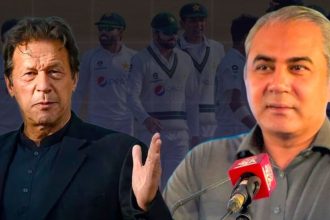In yet another riposte at the ruling party in the centre, PTI Chairman Imran Khan has blamed the federal government ‘for ruining the lives of ordinary citizens by crippling the national economy under the burden of borrowed money.’
In a statement issued on Wednesday, the PTI chief hit out at what he called blinkered economic policy aimed at benefiting a “selected coterie of supporters”.
“Private banks are making billions in profits at the taxpayer’s expense because the government is borrowing at steep rates from them and repaying the loans with taxpayer money,” Mr Khan was quoted as saying in a press release.
“These banks have effectively become sole lenders to the government,” Mr Khan said, adding that what should be happening is that consumers and private investors should obtain loans so that economic activity is encouraged in the country.
Mr Khan also questioned the government’s overall economic and financial policies, which he insisted were tailored to benefit a small group of supporters, while wreaking havoc with the lives of ordinary citizens.
Explaining the impact of excessive government borrowing from local commercial banks, Dr Ashfaque Hassan Khan – the dean of the NUST social sciences faculty – said that by doing so, the government was leaving little room for the private sector to secure credit, which slowed down growth.
Dr Hassan, who has advised the federal government in various capacities between 1998 and 2008, added: “With no investment in the private sector, growth will suffer, resulting in unemployment and poverty.”
In the first quarter of the current financial year, the government borrowed nearly half a trillion rupees, which showed how desperate a borrower the government had become, in that this was the only recourse available to them to cope with budgetary constraints.
Dr Hassan also lamented that the national economy was fast losing its capacity to produce more jobs.
The PML-N government, the PTI chief said, had failed to increase revenue collection from direct taxation and was merely increasing the burden on the poor and middle classes with indirect taxes, especially through petroleum products.
There was absolutely no need for the latest increase in petrol and diesel prices, Mr Khan said, pointing out that when international oil prices had fallen by 25 per cent in the first four months of this fiscal year, the government had only passed on a relief of less than 4 per cent, which meant that “the benefit of a more than 20 per cent drop in oil prices had been pocketed by the government.”





